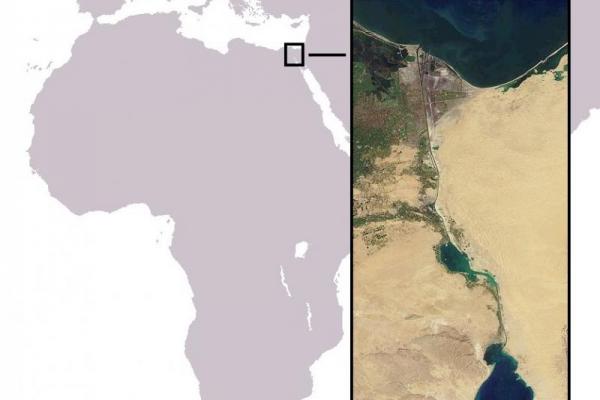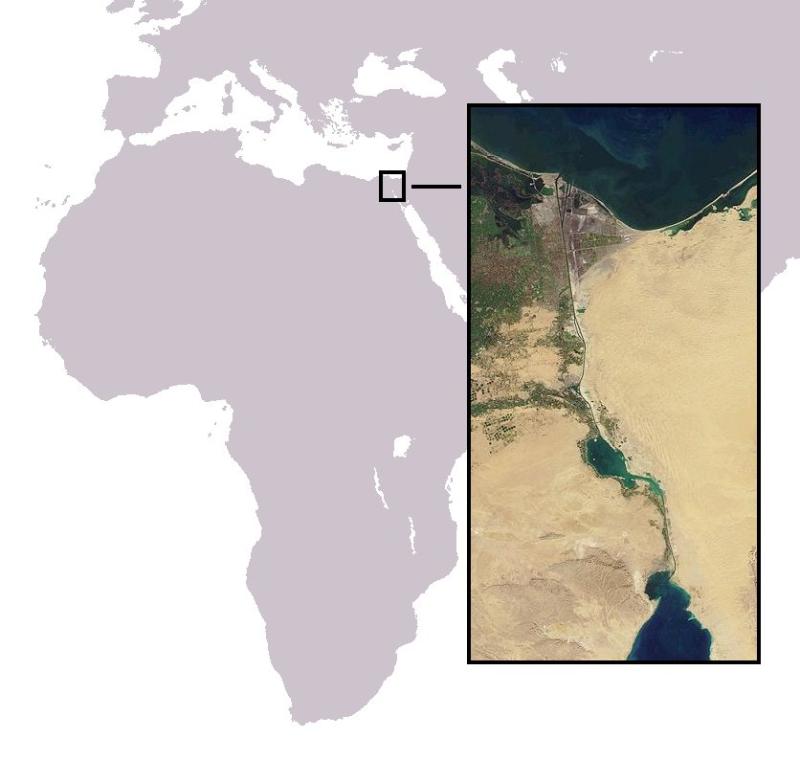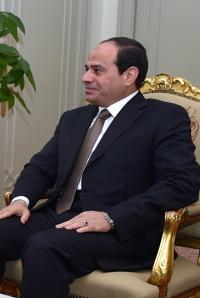The Suez Canal: A Route for Economic Stability in Egypt?

By: Taylor Giordullo
This year marks the 60th anniversary of the nationalization of the Suez Canal, a landmark feat for Egypt that defined it as an independent nation. On July 26, 1956, President Gamal Abdel Nasser seized the canal by force from British control. After facing some initial backlash from Britain, France and Israel, Egypt formally established its hold over the Suez Canal in March 1957. The people celebrated this demonstration of nationalism and Egyptian strength, and this act by Nasser is still revered as the central event in the establishing of a sovereign Egypt.

Suez Canal satalite image, NASA, Wikimedia Commons, 0CO
In 2011, Egypt faced another pivotal moment in its history, one that held the promise of a new era of Egyptian greatness based on democracy. Egypt was a key country involved in the Arab Spring, with hundreds of thousands of Egyptians gathering in Tahrir Square to protest the corrupt and oppressive leadership of President Hosni Mubarak. These impressive and mainly peaceful demonstrations led to the overthrow of their president, and the Egyptian people once again took to the streets in celebration, their jubilation mirroring that after the nationalization of the Suez Canal. Mubarak was replaced by President Mohamed Morsi, the first democratically elected leader of Egypt, in late 2012. This new president, rightfully chosen by the citizens, seemed promising for Egypt, a progressive step in the history of the country. However, the efforts of the Egyptian people led to yet another despotic leader, who according to Doctor Alam Payind, “served as President only to the Muslim Brotherhood and radical right-wing Islamists." Power was seized from Morsi in a military coup d’état in 2013.
The current President of Egypt, Abdel Fattah el-Sisi, Field Marshal in the Egyptian military, marked a return to military rule in Egypt by assuming this position. He is facing opposition in the country, which continues to labor under harsh economic conditions and a strong disillusionment with the democratic movement which took place there after the 2011 revolution. His latest strategy to address these issues centers on the Suez Canal.

President Abdel Fattah el-Sisi, United States Government, Wikimedia Commons, 0CO
The political turmoil that has racked Egypt [1] in recent years has done little in the way of improving daily life, especially when one considers the economy. Dr. Payind, the Director of the Middle East Studies Center at The Ohio State University, comments on the difficult economic situation that exists in Egypt, noting the country is “lacking oil resources to make it rich like the Gulf countries”.
This is a difficult economic situation may be attributed to several factors. While the economy Morsi inherited from Mubarak had its shortcomings, he did little to remedy it, instead focusing on a new constitution which gave himself and Islamic groups more power. This lack of attention to economic stimulation may have contributed to the situation today. 40% of Egypt’s youth population is unemployed [2], and the Egyptian currency continues to lose its value, with one Egyptian pound worth only 0.11 US dollars [3]. Egypt is also losing tourism revenue, as people are wary of traveling there with the recent lack of stability.
As a plan of action, President Sisi looks to the Suez Canal as a beacon of hope for his presidency and the Egyptian people. He believes the country’s economic future is dependent on this global waterway, and he has spent his time and energy facilitating a program to modernize the Suez. His plan includes establishing “an integrated maritime, industrial and agricultural infrastructure” which he believes will place “Egypt at the center of international maritime trade, manufacturing and commerce” [4]. He expands even further on these ideas, planning to create a tunnel system to connect the Sinai Peninsula to the Egyptian mainland. Sisi formed this idea with two primary ideas in mind: creating more jobs for the Egyptian youth and thwarting the growing presence of the Islamic State in Egypt. The Suez Canal Project has been dubbed Sisi’s “saving grace”, and it is currently his highest point of approval for the Egyptian people [4].
However, statistics from a recent survey reveal [5] that while the Suez Canal Project does garner Egyptian support, lack of support for Sisi continues to remain, as “73 percent of respondents did not listen to the President’s address on the anniversary of [his] new Suez Canal project” [5]. While the Egyptian people may support the idea of revitalizing the Suez, these recent polls indicate an overall disillusionment with their current president.
Dr. Payind was careful in his analysis of Sisi’s Suez Canal Project, taking a step back and claiming that it is difficult to make external judgments. He said that it would be necessary for Egypt to take its time and “create a cost-benefit analysis to decide whether or not this project will pay off in the future”. Dr. Payind explained that from the outside the project looks like the imperative of a dictator, and that the people are going along with it because he is the leader. However, he expressed concern about this pattern that is common with dictators, and argues that without careful analysis the Suez Canal Project is unlikely to succeed because “we cannot expect that wrong policies will result into right solutions”.
The Economist takes a harsher stance on Sisi and his ideas in an article entitled “The Ruining of Egypt”. The article claims that he often “pours taxpayers’ cash into grandiose projects” and further notes that “he has expanded the Suez Canal, yet its revenues have fallen” [6]. While the Economist does not blame Sisi for Egypt’s failing economy, citing other pre-existing issues like those Dr. Payind pointed out, the article indicates his policies do not seem to be remedying the economic situation.
The hope and significance that seems to run in the very waters of the Suez Canal is understandable. It hails back to an era of nationalism and triumph over Israel and the West, back to an example of Egyptian fortitude and progress. Dr. Payind sights the waterway as “not only a symbol of honor for Egypt but as its main source of economic revenue”. However, at least for the near future, it seems unlikely that it will solve all of Egypt’s problems, as the nation continues to combat corrupt dictators that have ruled the country since Nasser.
Sources:
- http://www.cnn.com/2016/04/27/middleeast/egypt-how-we-got-here/
- http://rebeleconomy.com/tag/egypt-unemployment/
- http://themoneyconverter.com/EGP/USD.aspx
- http://www.aljazeera.com/indepth/opinion/2016/08/sisi-faces-uncertain-promise-suez-160820125219983.html
- http://www.madamasr.com/news/baseera-poll-shows-decline-sisi-voter-base
- http://www.economist.com/news/leaders/21703374-repression-and-incompetence-abdel-fattah-al-sisi-are-stoking-next-uprising
